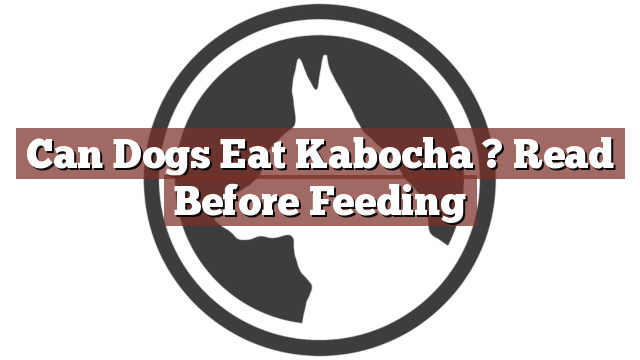Understanding Your Dog’s Dietary Needs
As a responsible pet owner, it is crucial to understand your dog’s dietary needs to ensure their overall health and well-being. Dogs have different nutritional requirements than humans, and some foods that are safe for us may be harmful or toxic to them. It is always important to research and consult with a veterinarian before introducing new foods into your dog’s diet.
Can Dogs Eat Kabocha? Read Before Feeding
Can dogs eat Kabocha? This is a common question among dog owners who enjoy this nutritious and delicious vegetable. The answer is yes, dogs can eat Kabocha in moderation. Kabocha, also known as Japanese pumpkin, is a type of winter squash that is packed with vitamins, minerals, and fiber. It is low in calories and a good source of beta-carotene, which is beneficial for your dog’s immune system and eye health.
However, it is crucial to prepare Kabocha properly before feeding it to your dog. Remove the seeds and peel the skin, as they can be difficult for dogs to digest. Cook the Kabocha thoroughly by steaming or boiling it to make it easier for your dog to chew and digest. Always serve it in small, bite-sized pieces to prevent any choking hazards.
Pros and Cons of Feeding Kabocha to Dogs
Feeding your dog Kabocha can have several benefits. The high fiber content in Kabocha can help regulate your dog’s digestive system and promote healthy bowel movements. Additionally, the beta-carotene in Kabocha is converted into vitamin A, which can improve your dog’s coat and skin health.
On the other hand, there are a few cons to consider as well. Kabocha is relatively high in carbohydrates, so it should be given in moderation, especially to dogs with weight issues or diabetes. Also, while the flesh of Kabocha is safe for dogs, the skin and seeds can be problematic. The skin might be difficult for dogs to digest, and the seeds can pose a choking hazard or cause an intestinal blockage.
Concluding Thoughts on Feeding Kabocha to Dogs
In conclusion, dogs can eat Kabocha as part of a balanced diet. However, it is vital to prepare it correctly and only serve the flesh, avoiding the skin and seeds. Like any new food, introduce Kabocha gradually into your dog’s diet and monitor how they react to it. If you notice any signs of digestive upset, such as diarrhea or vomiting, discontinue feeding Kabocha and consult with your veterinarian. Remember, every dog is different, so it is essential to consider your dog’s specific dietary needs and any underlying health conditions before introducing new foods.
Thank you for taking the time to read through our exploration of [page_title]. As every dog lover knows, our furry friends have unique dietary needs and responses, often varying from one canine to another. This is why it's paramount to approach any changes in their diet with caution and knowledge.
Before introducing any new treats or making alterations to your dog's diet based on our insights, it's crucial to consult with a veterinarian about [page_title]. Their expertise ensures that the choices you make are well-suited to your particular pet's health and well-being.
Even seemingly harmless foods can sometimes lead to allergic reactions or digestive issues, which is why monitoring your dog after introducing any new food item is essential.
The content provided here on [page_title] is crafted with care, thorough research, and a genuine love for dogs. Nevertheless, it serves as a general guideline and should not be considered a substitute for professional veterinary advice.
Always prioritize the expert insights of your veterinarian, and remember that the health and happiness of your furry companion come first.
May your journey with your pet continue to be filled with joy, love, and safe culinary adventures. Happy reading, and even happier snacking for your canine friend!

